 In an era where the intersection of leisure and altruism is increasingly popular, voluntourism has emerged as a significant yet controversial facet of modern travel. As travellers worldwide seek to merge vacationing with doing good, a critical examination of this phenomenon reveals a complex tapestry of intentions, impacts, and ethical considerations.
In an era where the intersection of leisure and altruism is increasingly popular, voluntourism has emerged as a significant yet controversial facet of modern travel. As travellers worldwide seek to merge vacationing with doing good, a critical examination of this phenomenon reveals a complex tapestry of intentions, impacts, and ethical considerations.
The Lure and Loopholes of Voluntourism
Voluntourism, a blend of volunteering and tourism, presents a seductive proposition: the opportunity to explore new destinations while contributing positively to local communities. The concept, at its core, promises a dual fulfilment of adventure and altruism. However, this idyllic scenario is not devoid of criticism.
A prominent concern is a focus on the traveller’s experience over the genuine needs of the community. Short-term stays, typically ranging from a day to a few weeks, often lack substantial preparation and follow-up, essential for meaningful volunteer work. This transient nature of voluntourism raises questions about its actual impact and sustainability.
The Hidden Costs of Good Intentions
The allure of making a difference can sometimes mask the potential harm of voluntourism. Unskilled volunteers, no matter how well-intentioned, can inadvertently cause more damage than benefit. For instance, working with vulnerable groups like children, without proper background checks or skills, can lead to negative consequences.
Moreover, the commercialization of voluntourism, predominantly operated by for-profit entities, further complicates the narrative. Instances of exploitation, such as staged orphanages and the display of children for tourists, have been documented, casting a shadow over the industry.
Greenwashing in Disguise?
The ethical quandary of voluntourism is further intensified by the environmental impact of travel and the phenomenon of ‘greenwashing’ – where actions are deceptively marketed to appear more environmentally friendly. This raises the question: are we contributing to sustainable change or simply buying into a feel-good experience?
Navigating the Voluntourism Landscape with Responsibility
For those genuinely interested in contributing, the key lies in thorough research and commitment to sustainable practices. Reputable volunteer organizations often require longer commitments and extensive preparation, ensuring a better alignment of volunteer skills with community needs.
Moreover, travellers can engage in responsible tourism by making conscious choices: opting for public transportation, supporting local businesses, and participating in community-led projects. Initiatives like beach clean-ups and tree planting, when done responsibly, can contribute to environmental conservation and community welfare.
 The Power of Conscious Choices in Hotels and Accommodations
The Power of Conscious Choices in Hotels and Accommodations
Hotels are increasingly recognizing their role in promoting sustainable practices. Initiatives like waiving room cleaning services in exchange for donations to local projects, participating in community clean-ups, and organizing environmental awareness events represent a shift towards more responsible tourism.
Conclusion
The realm of voluntourism, with its intricate layers of impact and intention, calls for a mindful approach to travel. While the aspiration to do good is commendable, it is crucial to navigate this landscape with an informed, ethical, and sustainable perspective. Through conscious choices and a commitment to genuine community involvement, travellers can indeed make a positive difference – one that extends beyond the allure of voluntourism and into the realm of impactful, responsible tourism.
Written by: My Thanh Pham
=====================================
















